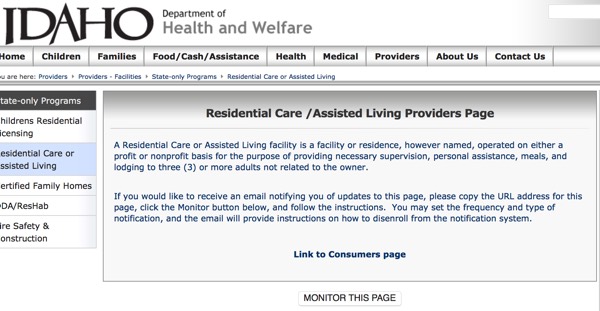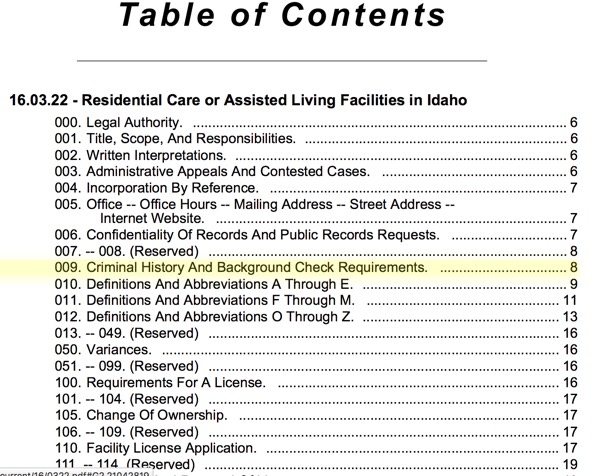Learn about Idaho’s assisted living regulations (& how to get a copy)!
Assisted Living, for the most part, is regulated at the state level, and each state has it’s own agency responsible for the regulation and oversight of assisted living. Additionally, how each state defines assisted living, and related terms may be a bit, or quite a bit different. Some states don’t even officially recognize the term ‘Assisted Living Facility.’
For Idaho the State Agency Responsible for Regulating Assisted Living is the Department of Health and Welfare.
A visit to the Department’s site offers some useful information and additional useful sections.
First, you’ll be greeted to a definition of Residential Care and Assisted living in Idaho.
There is a link to a consumer’s page which offers section on:
- Administrator Licensing
- Discharge Appeal
- Paying for or Choosing Care
- Protection & Advocacy
- Reporting Fraud
Additionally, down further on the page, you’ll see additional sections for:
- Inspections Reports and Awards (this section is really great, as you can quickly browse complaints, as well as facilities that have earned awards).
- A consumer checklist on choosing a good assisted living residence
- Facility lists, including an alphabetical .pdf document listing all of the 287 (at this time) licensed assisted living facilities in Idaho. They are coded by AD, for Alzheimer’s and Dementia, DD for Developmentally Disabled, EL for Elderly, MI for Mental Illness, PD for Physically Disabled, and TB for Traumatic Brain Injury.
Where can I get a copy of Idaho’s assisted living and residential care regulations?
The State offers a comprehensive PDF document, which, at this time is almost 80 pages.
http://adminrules.idaho.gov/rules/current/16/0322.pdf
The document covers topics and regulations including:
- Legal Authority
- Title, Scope and Responsibilities
- Definitions
- Requirements of a License, License Processes and Application
- Requirements of a Facility Administrator
- Requirements for Termination of Admission Agreement
- Food Preparation and Service
- Requirements to Protect Residents from Abuse
- Core Issues Deficiency
- Enforcement Remedy of Revocation of Facility License
and so much more.
This document is freely available to the public, and can be easily saved, and printed.
Family members who have a loved one in an assisted living facility should be familiar with this document, and at the very minimum, have a copy, or bookmark the document page for easy access and reference.
Residents of an assisted living home should keep a copy of these rules and regulations (unless they are not able to do so, or understand them due to memory disorders or other cognitive issues). The best way to be empowered as a resident is to understand the rules and regulations that have been set forth by the State of Idaho.
Facility Staff and Administrators should be intimately familiar with these regulations, since, failure to maintain them can result in violations or citations, or worse, health or safety issues that could endanger the residents.
Finally, these regulations are helpful, if not essential for anyone who is considering opening their own assisted living home. These regulations will give you a good idea of what is involved in the day-to-day operation of an assisted living residence, and how to get started with the licensure and application process.





The state of Idaho’s assisted living licensing and ombudsmen seriously let my family down. In 2012, my frail Mom and step father with dementia moved into an assisted living facility in Rathdrum, Idaho. This facility advertised being the only deficit free facility in Idaho. The facility was 1 ½ hours away from me, but my Aunt had been there and my cousin really loved the place. For eight months, the facility housed my parents in an unlicensed house until they had room for them in a newly built addition to their facility. We were unaware that the house was not licensed.
In 2014, the facility was unable to prevent my Mom from falling repeatedly, but would not allow me to take her to the hospital. They even called the police to prevent me from taking her. When I called Boise, the State Ombudsman over the Area Agency on Aging of Idaho informed me that the local ombudsman and facility owner didn’t have very good things to say about me and she then suggested that I “relax and go get a massage”. In the meantime, the facility owner told my cousin untrue things to get her to take over control of my parents. They managed to get my Mom, who had dementia, to sign 14 release of liability forms, a DNR form, as well as legal paperwork to switch her DPOA from me to my cousin without informing me of anything. Then all of my parent’s money was secretly moved out of the accounts my parents had set up with me as joint owner.
Within days, my Mom was signed up for hospice care. Mom passed away weighing 89 pounds with a third degree bedsore. I was not notified of her decline until she had passed. Mom and I were best friends, so it haunts me that she passed away in pain and without me by her side. The owner had previously promised me that she would do everything possible so I could make it to my Mom when the end was near, but instead, she did everything to prevent me from being there.
I found two amazing attorneys to represent this case. After 1 ½ years of discovery and 4 full days of an evidentiary hearing concerning the capacity of my Mom to enter into Non-Binding Mediation and Binding Arbitration Agreements, the following are excerpts from the 16 pages of Judge’s Opinion:
– After records were requested, the facility owner made over 100 deliberate changes, additions, and deletions to my Mom’s nurse’s notes. Many of the alterations removed entries tending to show the mental and physical condition of my Mom.
– The Court found the owner’s testimony to be wholly unreliable and completely lacking in credibility based on a number of factors including her demeanor and manner of testifying, inconsistencies and her apparently phony, illogical and unbelievable testimony.
The defendants filed an appeal. We decided to go through mediation instead of waiting for the lengthy appeal process and proceeded to settle out of court.
With all this evidence, the State of Idaho refuses to investigate and considers the case closed. This facility is able to continue caring for up to 48 residents without anyone knowing what happened to my parents. They continue to advertise as deficit free and have many glowing reviews. This seems like a huge injustice to the frail individuals they care for as well as the trusting families involved